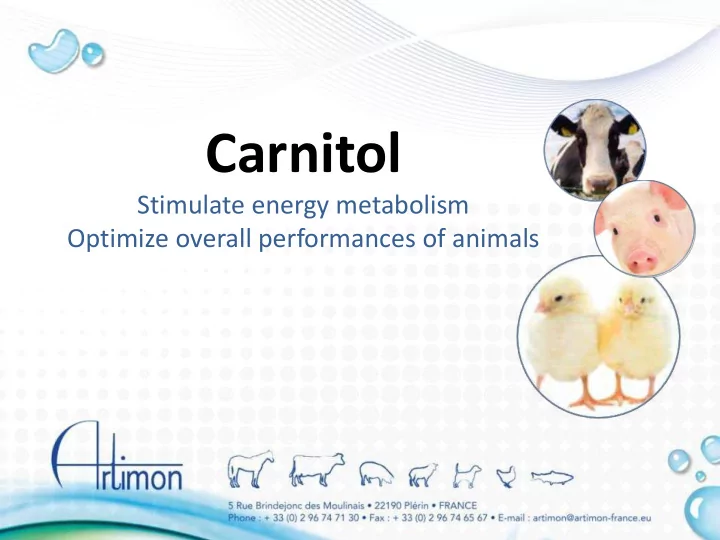

Carnitol Stimulate energy metabolism Optimize overall performances of animals
Carnitol, for improved hepatic functions A unique combination • Carnitol is a unique combination of ingredients selected to stimulate energy metabolism and to optimize overall performances of animals. L-Carnitine Sorbitol Plant extracts Magnesium 11/2013 Page 2
Carnitol, for improved hepatic functions Carnitine, a key ingredient • Carnitine, derived from an amino acid, is found in nearly all cells of the body. • Carnitine is the generic term for a number of compounds that include L-carnitine, acetyl-L- carnitine, and propionyl-L-carnitine. • The D-form does not occur in nature but may be obtained by chemical synthesis. The D isomer of carnitine is biologically inactive and it also hinders activities of L-carnitine. 11/2013 Page 3
Carnitol, for improved hepatic functions L-Carnitine, a key ingredient • Convert fat into energy . – Improve energy metabolism and energy feed convertion • Cardio-vascular system – Heart energy comes mostly from fat and L-Carnitine • Antioxidant support – Serves as an antioxidant • Maintaining muscle integrity – provide blood flow to smooth muscles 11/2013 Page 4
Carnitol, for improved hepatic functions L-Carnitine, a key ingredient • Carnitine plays a critical role in energy production. It transports long-chain fatty acids into the mitochondria so they can be oxidized ("burned") to produce energy. 11/2013 Page 5
Carnitol, for improved hepatic functions L-Carnitine, other functions • Buffering and removing of the potentially toxic acyl groups from cells • Regulate the ratios free CoA / acylCoA in 2 separate cellular compartments (cytosol and mitochondria) • Regulate gluconeogenesis, fatty acid synthesis and ketone bodies, branched chain amino acid, triglyceride and cholesterol metabolism 11/2013 Page 6
Carnitol, for improved hepatic functions L-Carnitine, supplementary sources • Carnitine occurs naturally in microorganisms, plants and animals. • The major dietary sources are red meat, poultry, fish and dairy products [59]. Animal meals contain 10 to 20 times more L- carnitine than plant-based feedstuffs. 11/2013 Page 7
Carnitol, for improved hepatic functions L-Carnitine for animal health • Because feedstuffs are mainly composed by non-animal raw materials, it is useful to incorporate L-carnitine into diets to ensure that animals receive adequate amounts of L-carnitine. • L-carnitine oral supplementation is recommended in case of metabolic burdens such as exercise, heat or cold exposure or when energy demands are elevated (growth in young animals, high zootechnical performance or fat-enriched diet). 11/2013 Page 8
Carnitol, for improved hepatic functions L-Carnitine, distribution • L-carnitine oral supplementation can be realised either in the drinking water or directly in the diet. Since this compound is easily dissolved in water, the drinking water is often preferred to achieve a homogeneous mixture. 11/2013 Page 9
Carnitol, for improved hepatic functions Sorbitol, choleretic and cholagogue • Sorbitol is especially indicated for its favorable effect on liver metabolism. • Sorbitol increases the secretion of digestive enzymes (pancreatic one) and therefore promotes good digestion of feed and avoids fat overload by increasing the production of bile salt (choleretic and cholagogue effect) • Sorbitol acts as an osmotic substance and facilitates the elimination of toxic products. 11/2013 Page 10
Carnitol, for improved hepatic functions Magnesium • Magnesium is the fourth most abundant cation in the body and plays an important physiological role in many of its functions. • Magnesium balance is maintained by renal regulation of magnesium reabsorption. • Magnesium has a key role in many biological processes such as cellular energy metabolism, cell replication, and protein synthesis. 11/2013 Page 11
Carnitol, for improved hepatic functions Plant extracts : Artichock (Cynara scolymus ) • The active contituents of C. scolymus are mainly flavonoids and caffeoylquinic acid • These compounds have been proved to have hepatoprotective activity, hypolipidemic effect, antioxidant capacity and anti-inflammatory properties 11/2013 Page 12
Carnitol, for improved hepatic functions Plant extracts : Gentiana (Gentiana lutea ) • The active principles are the bitter tasting secoiridoid glycosides gentiopicrin and amarogentin. • G. lutea is very popular as a stomachic as well as a component in preparations showing beneficial effects in gall and liver diseases 11/2013 Page 13
Carnitol, for improved hepatic functions Energy metabolism improvement L-carnitine Transports long Sorbitol chain fatty acids Encourages bile Allows storage production and and release of secretion fats in case of Plant extracts high energy Hepatoprotective Stimulates liver needs and digestive activity functions Magnesium Energy metabolism Protein synthesis 11/2013 Page 14
Carnitol, for improved hepatic functions Field trial (2006): Effect of Carnitol on growth performances of broilers Materials and method. • 360 birds d-1 old allocated into 2 groups (Control or Carnitol) • Feed: standard broiler prestarter (0 to10 days), a starter (10 to 21 days), a grower “high -energy diet ” 3280 kcal/kg (21 to 35 days- pellets) and a finisher (35 to 42 days-pellets). • Treatment: Addition of Carnitol in drinking water at 1 ml/L on days 28, 29 and 30 for Carnitol group only. 11/2013 Page 15
Carnitol, for improved hepatic functions Field trial (2006): Effect of Carnitol on growth performances of broilers Results. Carnitol supplemented in drinking water on broilers fed with high energy diet improves growth performance by increasing body weight gain and FCR. 11/2013 Page 16
Carnitol, for improved hepatic functions Carnitol, main targets • Reduction of fatty liver syndrome • Optimized energetic metabolism • Improve fat digestibility • Improved production performances 11/2013 Page 17
Carnitol, for improved hepatic functions Carnitol, advance formulation • L-carnitine : 60 000 mg/L • Sorbitol syrup : 250 000 mg/L • Magnesium : 20 000 mg/L • Plant extracts : Cynara scolymu s and Gentiana lutea 11/2013 Page 18
Carnitol, for improved hepatic functions Direction for use • Poultry, swine: 1ml/L of drinking water for 3 to 5 days • Cattle, camels, horses: 20 ml/100kg body weight per day. • Sheep, goats, calves: 4 ml/10 kg body weight per day. 11/2013 Page 19
Recommend
More recommend